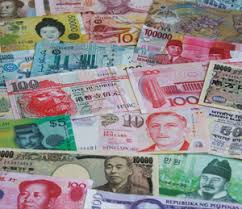By Lilian Karunungan - Oct 12, 2012 8:13 AM GMT+0400
 The Monetary Authority of Singapore, which uses the exchange rate to manage inflation, said in its bi-annual policy review today it will maintain a modest and gradual appreciation of the local dollar. Applications for unemployment benefits in the U.S. dropped to 339,000 in the week ended Oct. 6, the fewest since February 2008, official figures showed yesterday. Gains in the Bloomberg-JPMorgan Asia Dollar Index were curbed this week after the International Monetary Fund cut on Oct. 9 its projections for global expansion this year and next.
The Monetary Authority of Singapore, which uses the exchange rate to manage inflation, said in its bi-annual policy review today it will maintain a modest and gradual appreciation of the local dollar. Applications for unemployment benefits in the U.S. dropped to 339,000 in the week ended Oct. 6, the fewest since February 2008, official figures showed yesterday. Gains in the Bloomberg-JPMorgan Asia Dollar Index were curbed this week after the International Monetary Fund cut on Oct. 9 its projections for global expansion this year and next.
Asian currencies rose, adding to a weekly gain, after Singapore unexpectedly kept its bias for currency gains and U.S. jobless claims fell, spurring demand for riskier assets.
“The U.S. data overnight and the surprise move of the MAS are positive for risk sentiment,” said Radhika Rao, an economist at Forecast Pte in Singapore. “The downgrades in emerging-market growth as well as advanced economies have brought growth concerns to the forefront. Obviously that’s limiting potential Asian-currency gains.”
Singapore’s dollar strengthened 0.5 percent to $S1.2220 per dollar as of 11:08 a.m. local time, boosting its weekly advance to 0.6 percent, according to data compiled by Bloomberg. Malaysia’s ringgit appreciated 0.3 percent today, paring the decline in the past five days to 0.2 percent. Taiwan’s dollar rose 0.4 percent from a week ago to NT$29.259. China’s yuan rose 0.2 percent for a weekly gain of 0.3 percent.
The Asia Dollar Index, which tracks the region’s 10 most- active currencies outside Japan, advanced 0.2 percent today. The gauge climbed 0.3 percent this week.
Inflation Risks
Singapore joins China AND India in limiting monetary stimulus as they guard against inflation risks even as Europe’s sovereign debt crisis weighs on the world economy. The MAS said its policy remains appropriate to contain inflation and ensure growth even after the local economy contracted last quarter.
Five of 23 financial companies in a Bloomberg News survey predicted the decision by Singapore’s central bank, with the remainder forecasting a loosening of policy.
The world economy will expand 3.3 percent this year, the slowest since the 2009 recession, according to the IMF, compared with a July prediction of 3.5 percent.
The ringgit rose the most in almost two weeks after official data yesterday showed factory output declined less than economists predicted.
‘Remain Resilient’
Industrial production contracted 0.7 percent in August from a year earlier, compared with the median of estimates for a 2 percent drop in a Bloomberg survey. The economy is forecast by the government to grow as much as 5 percent this year. The central bank’s benchmark rate is at 3 percent, compared with near-zero levels in the U.S. and Japan. The ringgit rose on speculation exports to neighboring Singapore will benefit from the city-state’s plan to allow currency gains.
“Malaysia’s economic fundamentals remain well supported by resilient domestic demand,” said Yeah Kim Leng, chief economist at RAM Holdings Bhd. in Kuala Lumpur. “The ringgit will be well supported in the short term. Capital inflows, together with the positive interest-rate differential and rising investments will help to offset the export slowdown.”
China’s yuan rose beyond 6.28 per dollar for the first time in 19 years this week amid speculation the government will step up measures to counter a slowdown. The People’s Bank of China raised the reference rate by 0.2 percent today, the most since March 16, to 6.3264 per dollar.
Yuan Extends Rally
The currency headed for a 10th weekly advance as China asked local authorities to spend more on public transport to ease congestion and reduce pollution, according to a statement posted on the central government’s website on Oct. 10 after a State Council meeting presided by PremierWen Jiabao. The Chinese Communist Party will hold a congress starting Nov. 8 at which new leaders will be appointed ahead of a once-a-decade handover of power.
“Investors are speculating the government will announce more measures after the Party Congress to avert a slowdown,” said Banny Lam, a Hong Kong-based chief economist at CCB International Securities Ltd., a unit of China’s second-largest bank. “China’s economic growth will probably rebound in the fourth quarter.”
Elsewhere in Asia, South Korea’s won gained 0.1 percent this week to 1,110.90 per dollar, whileIndonesia’s rupiah was little changed at 9,595. Thailand’s baht lost 0.4 percent to 30.67 and India’s rupee slid 1.5 percent to 52.665, set for the worst week since June.
To contact the reporter on this story: Lilian Karunungan in Singapore at lkarunungan@bloomberg.net
To contact the editor responsible for this story: Amit Prakash at aprakash1@bloomberg.net